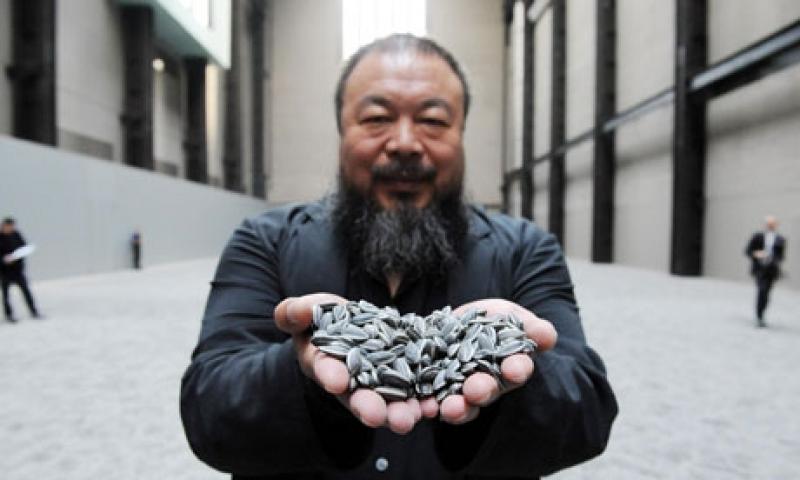Imagine: Ai Weiwei - Without Fear or Favour, BBC One | reviews, news & interviews
Imagine: Ai Weiwei - Without Fear or Favour, BBC One
Imagine: Ai Weiwei - Without Fear or Favour, BBC One
Imagine a China where artists are unrestrained

If you found yourself thinking that you were watching Mission: Impossible rather than Imagine, you could have been forgiven. Alan Yentob had clearly been banned from meeting Ai Weiwei in China, and so one of their interviews was conducted over a webcam, with Yentob sitting in the dark, like some spymaster of the arts.
This was even before Ai had been put under house arrest to prevent him from attending a party he arranged to celebrate the demolition of his studio in Shanghai (a studio which the Chinese Government had asked him to put up in the first place...). All of which prompts the question: what does that say about the place of the artist in China?
There is clearly a tension in Ai's standing: he makes popular contemporary art and speaks English, thus is a good ambassador for a "freer" Chinese culture, but the content of his art is invariably at odds with the Communist Party's aims. He is embraced by the state as the architect of the Bird's Nest Olympic Stadium and reviled for his investigations into the Sichuan earthquake and a resultant artwork in Germany where schoolbags, standing for the dead children, were stacked into a massive wall and painted with the words of a grieving mother.
There are other globally known Chinese artists with satirical or even subversive bents, but they have never made it into the popular consciousness, perhaps realising their freedom is circumscribed by their popularity, or rather is engendered by their anonymity. If Yue Minjun and his smiling Maos (after Bacon and Velázquez's popes) attained global celebrity, he might too find himself unable to move.
His father set an example to Ai of free-thinking: a poet favoured by Mao until an unacceptable allegorical work, Ai Qing was exiled to the Gobi Desert. Ai himself fled to New York when the opportunity arose, where he was inspired by the Tompkin Square Park Riot as an example of citizens resisting the Government, and by the Iran-Contra hearings when the Government investigated itself. These are dangerous ideas, and Ai is lucky he did not take himself back to China until after Tiananmen. "Lucky" is the word, given that he has been a magnet for trouble: midnight beatings by the police (whose sound he recorded and Imagine replays), the latest house arrest. Had he been there, he might have joined his father at the protests.
 The prompt for this show is the installation of Ai's 100 million sunflower seeds in the Turbine Hall at Tate Modern. As each one is handmade and hand-painted porcelain, by a town of 1600 in China working for several years, there is a lot more craft than meets the eye, which is true for all of Ai's work, including the tables and chairs seemingly jammed together but in fact created without nails (pictured right).
The prompt for this show is the installation of Ai's 100 million sunflower seeds in the Turbine Hall at Tate Modern. As each one is handmade and hand-painted porcelain, by a town of 1600 in China working for several years, there is a lot more craft than meets the eye, which is true for all of Ai's work, including the tables and chairs seemingly jammed together but in fact created without nails (pictured right).
By referencing the sunflower seeds that millions of Chinese had to subsist on during the Cultural Revolution, he is subverting the glorious past, but more importantly, by uniting 1600 people in doing this, by reinforcing a community with a labour not directed at the communist good, he is providing an alternative source of identity in a country where the Party is all; the subtlest form of revolution.
- Watch Imagine: Ai Weiwei – Without Fear or Favour on BBC iPlayer
Explore topics
Share this article
The future of Arts Journalism
You can stop theartsdesk.com closing!
We urgently need financing to survive. Our fundraising drive has thus far raised £49,000 but we need to reach £100,000 or we will be forced to close. Please contribute here: https://gofund.me/c3f6033d
And if you can forward this information to anyone who might assist, we’d be grateful.

Subscribe to theartsdesk.com
Thank you for continuing to read our work on theartsdesk.com. For unlimited access to every article in its entirety, including our archive of more than 15,000 pieces, we're asking for £5 per month or £40 per year. We feel it's a very good deal, and hope you do too.
To take a subscription now simply click here.
And if you're looking for that extra gift for a friend or family member, why not treat them to a theartsdesk.com gift subscription?

Add comment